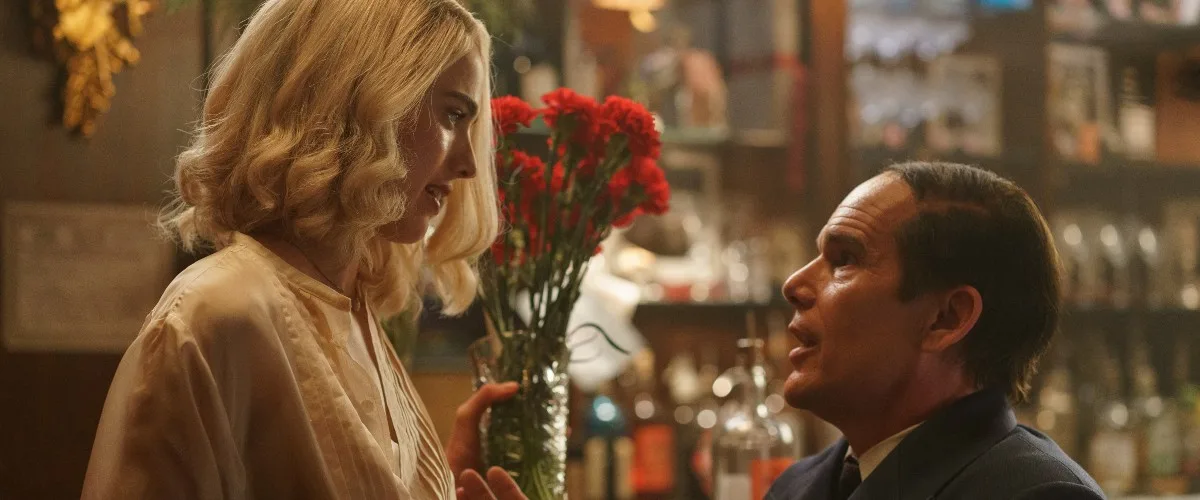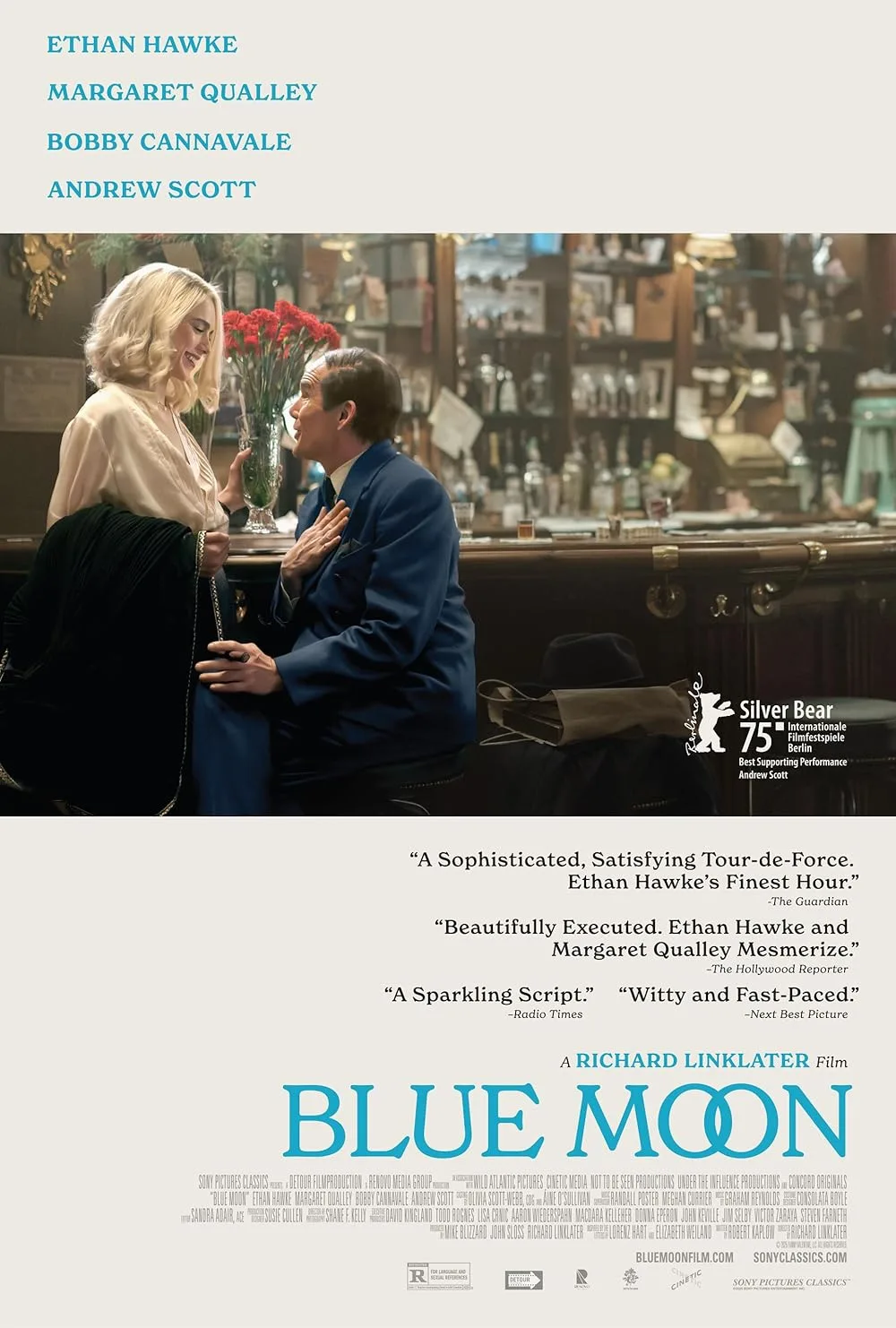Relevance and love don’t slam a door in your face. They just stop thinking about you.
This idea is at the core of Richard Linklater’s excellent “Blue Moon,” a writer’s yin to the director’s yang of his also-upcoming “Nouvelle Vague.” Wherein that film is about the art of the director via the making of Jean Luc-Godard’s “Breathless,” this one captures the heart of the writer through one of the last nights in the life of Lorenz Hart (Ethan Hawke), who was once one of the most acclaimed Broadway songwriters on the scene before fame and passion stopped returning his calls. He’s now the drunk at the end of the bar, the guy who gets there first and leaves last, and the one who can barely hide the pain behind his non-stop commentary on film, Broadway, and everything else around him. Working from a script by Robert Kaplow, Linklater has crafted one of his finest dramedies, a consistently fascinating exploration of the frailty of the artist, buoyed by one of Ethan Hawke’s most remarkable performances.
Both Hawke and Linklater have been fascinated by artistry throughout their careers, from Richard making “Me and Orson Welles” to Ethan leading “Born to Be Blue” (about Chet Baker). Reuniting with the star of his “Before” movies and “Boyhood,” Linklater casts his friend as the cynical half of Rodgers and Hart, a pair of Broadway composers who wrote timeless numbers like “The Lady is a Tramp,” “My Funny Valentine,” and the title track. Rodgers wrote the tunes; Hart took the lyrics. And Larry can’t stand the lyrics on the opening night of Dick’s new show, a little production called Oklahoma!. He bails before the curtain call on March 31, 1943, making his way to Sardi’s to start the party early. He holds intellectual court with a bartender named Eddie (Bobby Cannavale) and a pianist he nicknames Knuckles (Jonah Lees), complaining about parts of “Casablanca” he doesn’t like while also repeating his favorite line from that classic: “Nobody ever loved me that much.”
The first, long scene that’s basically just a rolling conversation between Hart, the bartender, and the piano player is an absolute gem. From the very beginning, Hawke is doing something remarkable, conveying a dizzying blend of both intellect and anxiety. He is smart enough to see how life is passing him by. As he points out, despite its cornpone lyrics and that awful exclamation point, Oklahoma! is going to be a huge hit. It will run for generations, and Rodgers (Andrew Scott) will leave him behind to work exclusively with Oscar Hammerstein (Simon Delaney). But Hawke doesn’t play him as a sad-sack loser, despite his diminutive size. Hart was actually 4’10” and Linklater makes the decision to play that through forced perspective that, admittedly, can sometimes be distracting even as it adds to Hart’s insecurity.
He cracks jokes, smiles, and even inspires columnist E.B. White (Patrick Kennedy) to write a children’s classic. The pain is largely underneath, in the quiet moments, in the asides, in the glances where Hawke’s performance hums. And it’s in how much we believe in both Hart’s self-destructive behavior and his undeniable intelligence. Few actors can believably play witty like Ethan Hawke, who convinces us he’s not just reciting lines but responding in every scene with all this character has left: his way with words.
If there are stakes to the admittedly very talky “Blue Moon,” it’s in Larry’s hope that he’s found love with a college girl named Elizabeth (Margaret Qualley). Yes, she’s less than half his age and unlikely to be interested in this alcoholic writer who most people think is gay anyway, but he’s allowed himself to dream. They had a moment together at a cabin not long ago in which it seemed like that door might be open, and she’s going to be at the party tonight. Maybe, just maybe, he can find happiness, too. Qualley is expectedly wonderful, not only looking like she would have been a gigantic star in the ‘40s but finding an innocent joy that’s essential to this character. Of course, everyone who meets her becomes enchanted by her. Who wouldn’t?
“Blue Moon” shifts gears when Rodgers arrives, giving Scott a chance in the spotlight, too. Another actor who looks like he stepped out of a noir of this era, Scott imbues Rodgers with a pitch-perfect blend of reverence and resentment for his writing partner. There’s a scene on a staircase landing that’s a masterpiece on every level as the two men dance around the issues that have defined their lives. Scott captures how much Richard knows he still owes a great debt to the man who made his career, but he also can’t stand how he was often too drunk to get anything done. People who have worked together for years have relationships forged by highs and lows; joyful core memories blended with the times when they were disappointed by someone they relied on. Rarely has a scene captured this dynamic better as Rodgers both encourages Hart to get his shit together and knows he won’t. He looks like he wants to hug and punch him at the same time. Hawke allows some of his character’s desperation to peek through, too, but Hart can’t stop himself from criticizing the pandering of Oklahoma! at the same time. He is one of many people in this world who remains his own worst enemy. We all know people like that.
Richard Rodgers leaves that conversation to go upstairs to a party that Lorenz Hart never really attends. At the end of the night, Rodgers has gone on to a better one. Lorenz Hart would die less than a year later, drunk and alone. It’s a film that invites one to reflect on the lyrics Lorenz Hart wrote for the song that gives it its title. “I heard somebody whisper, “Please, adore me.” Despite all his cynical claims otherwise, Lorenz Hart needed to be adored, too. If only someone could love him that much.
This review was filed from the Toronto Film Festival on September 5. It opens on October 17, 2025.




















